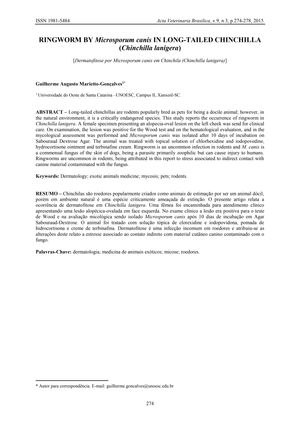Ringworm by Microsporum Canis in Long-Tailed Chinchilla (Chinchilla Lanigera)
December 2015
in “
Acta Veterinaria Brasilica
”

TLDR A chinchilla got ringworm from stress and contact with dog-related items.
This study reported a case of ringworm in a female Chinchilla lanigera, presenting an alopecia-oval lesion on the left cheek. The lesion tested negative for the Wood test, and hematological evaluation showed normal cell parameters with a tendency to eosinophilia. Mycological assessment identified Microsporum canis after 30 days of incubation. Ringworm, uncommon in rodents, was attributed to stress and indirect contact with contaminated canine material.
